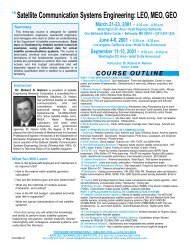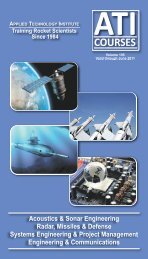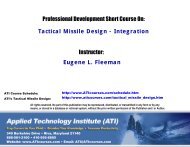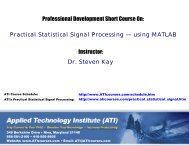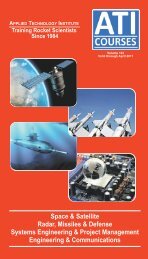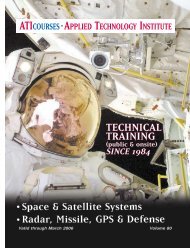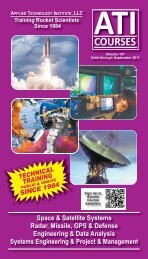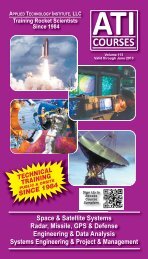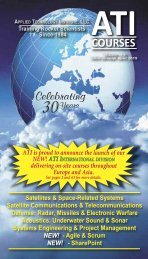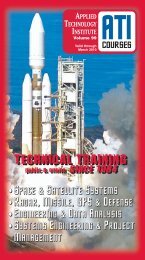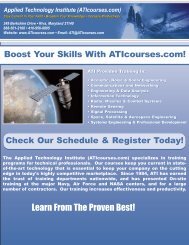Systems Engineering - ATI
Systems Engineering - ATI
Systems Engineering - ATI
You also want an ePaper? Increase the reach of your titles
YUMPU automatically turns print PDFs into web optimized ePapers that Google loves.
Fundamentals of Rockets and Missiles<br />
October 12-14, 2010<br />
Las Vegas, Nevada<br />
February 1-3, 2011<br />
Beltsville, Maryland<br />
March 8-10, 2011<br />
Beltsville, Maryland<br />
$1590 (8:30am - 4:00pm)<br />
"Register 3 or More & Receive $100 00 each<br />
Off The Course Tuition."<br />
Summary<br />
This course provides an overview of rockets and missiles<br />
for government and industry officials with limited technical<br />
experience in rockets and missiles. The course provides a<br />
practical foundation of knowledge in rocket and missile issues<br />
and technologies. The seminar is designed for engineers,<br />
technical personnel, military specialist, decision makers and<br />
managers of current and future projects needing a more<br />
complete understanding of the complex issues of rocket and<br />
missile technology The seminar provides a solid foundation in<br />
the issues that must be decided in the use, operation and<br />
development of rocket systems of the future. You will learn a<br />
wide spectrum of problems, solutions and choices in the<br />
technology of rockets and missile used for military and civil<br />
purposes.<br />
Attendees will receive a complete set of printed notes.<br />
These notes will be an excellent future reference for current<br />
trends in the state-of-the-art in rocket and missile technology<br />
and decision making.<br />
Instructor<br />
Edward L. Keith is a multi-discipline Launch Vehicle System<br />
Engineer, specializing in integration of launch<br />
vehicle technology, design, modeling and<br />
business strategies. He is currently an<br />
independent consultant, writer and teacher of<br />
rocket system tec hnology. He is experienced<br />
in launch vehicle operations, design, testing,<br />
business analysis, risk reduction, modeling,<br />
safety and reliability. He also has 13-years of government<br />
experience including five years working launch operations at<br />
Vandenberg AFB. Mr. Keith has written over 20 technical<br />
papers on various aspects of low cost space transportation<br />
over the last two decades.<br />
Who Should Attend<br />
• Aerospace Industry Managers.<br />
• Government Regulators, Administrators and<br />
sponsors of rocket or missile projects.<br />
• Engineers of all disciplines supporting rocket and<br />
missile projects.<br />
• Contractors or investors involved in missile<br />
development.<br />
• Military Professionals.<br />
What You Will Learn<br />
• Fundamentals of rocket and missile systems.<br />
• The spectrum of rocket uses and technologies.<br />
• Differences in technology between foreign and<br />
domestic rocket systems.<br />
• Fundamentals and uses of solid and liquid rocket<br />
systems.<br />
• Differences between systems built as weapons and<br />
those built for commerce.<br />
Course Outline<br />
1. Introduction to Rockets and Missiles. The Classifications<br />
of guided, and unguided, missile systems is introduced. The<br />
practical uses of rocket systems as weapons of war, commerce<br />
and the peaceful exploration of space are examined.<br />
2. Rocket Propulsion made Simple. How rocket motors and<br />
engines operate to achieve thrust. Including Nozzle Theory, are<br />
explained. The use of the rocket equation and related Mass<br />
Properties metrics are introduced. The flight environments and<br />
conditions of rocket vehicles are presented. Staging theory for<br />
rockets and missiles are explained. Non-traditional propulsion is<br />
addressed.<br />
3. Introduction to Liquid Propellant Performance, Utility<br />
and Applications. Propellant performance issues of specific<br />
impulse, Bulk density and mixture ratio decisions are examined.<br />
Storable propellants for use in space are described. Other<br />
propellant Properties, like cryogenic properties, stability, toxicity,<br />
compatibility are explored. Mono-Propellants and single<br />
propellant systems are introduced.<br />
4. Introducing Solid Rocket Motor Technology. The<br />
advantages and disadvantages of solid rocket motors are<br />
examined. Solid rocket motor materials, propellant grains and<br />
construction are described. Applications for solid rocket motors as<br />
weapons and as cost-effective space transportation systems are<br />
explored. Hybrid Rocket <strong>Systems</strong> are explored.<br />
5. Liquid Rocket System Technology. Rocket Engines, from<br />
pressure fed to the three main pump-fed cycles, are examined.<br />
Engine cooling methods are explored. Other rocket engine and<br />
stage elements are described. Control of Liquid Rocket stage<br />
steering is presented. Propellant Tanks, Pressurization systems<br />
and Cryogenic propellant Management are explained.<br />
6. Foreign vs. American Rocket Technology and Design.<br />
How the former Soviet aerospace system diverged from the<br />
American systems, where the Russians came out ahead, and<br />
what we can learn from the differences. Contrasts between the<br />
Russian and American Design philosophy are observed to provide<br />
lessons for future design. Foreign competition from the end of the<br />
Cold War to the foreseeable future is explored.<br />
7. Rockets in Spacecraft Propulsion. The difference<br />
between launch vehicle booster systems, and that found on<br />
spacecraft, satellites and transfer stages, is examined The use of<br />
storable and hypergolic propellants in space vehicles is explained.<br />
Operation of rocket systems in micro-gravity is studied.<br />
8. Rockets Launch Sites and Operations. Launch Locations<br />
in the USA and Russia are examined for the reason the locations<br />
have been chosen. The considerations taken in the selection of<br />
launch sites are explored. The operations of launch sites in a more<br />
efficient manner, is examined for future systems.<br />
9. Rockets as Commercial Ventures. Launch Vehicles as<br />
American commercial ventures are examined, including the<br />
motivation for commercialization. The Commercial Launch Vehicle<br />
market is explored.<br />
10. Useful Orbits and Trajectories Made Simple. The<br />
student is introduced to simplified and abbreviated orbital<br />
mechanics. Orbital changes using Delta-V to alter an orbit, and<br />
the use of transfer orbits, are explored. Special orbits like<br />
geostationary, sun synchronous and Molnya are presented.<br />
Ballistic Missile trajectories and re-entry penetration is examined.<br />
11. Reliability and Safety of Rocket <strong>Systems</strong>. Introduction<br />
to the issues of safety and reliability of rocket and missile systems<br />
is presented. The hazards of rocket operations, and mitigation of<br />
the problems, are explored. The theories and realistic practices of<br />
understanding failures within rocket systems, and strategies to<br />
improve reliability, is discussed.<br />
12. Expendable Launch Vehicle Theory, Performance and<br />
Uses. The theory of Expendable Launch Vehicle (ELV)<br />
dominance over alternative Reusable Launch Vehicles (RLV) is<br />
explored. The controversy over simplification of liquid systems as<br />
a cost effective strategy is addressed.<br />
13. Reusable Launch Vehicle Theory and Performance.<br />
The student is provided with an appreciation and understanding of<br />
why Reusable Launch Vehicles have had difficulty replacing<br />
expendable launch vehicles. Classification of reusable launch<br />
vehicle stages is introduced. The extra elements required to bring<br />
stages safely back to the starting line is explored. Strategies to<br />
make better RLV systems are presented.<br />
14. The Direction of Technology. A final open discussion<br />
regarding the direction of rocket technology, science, usage and<br />
regulations of rockets and missiles is conducted to close out the<br />
class study.<br />
Register online at www.<strong>ATI</strong>courses.com or call <strong>ATI</strong> at 888.501.2100 or 410.956.8805 Vol. 104 – 11



